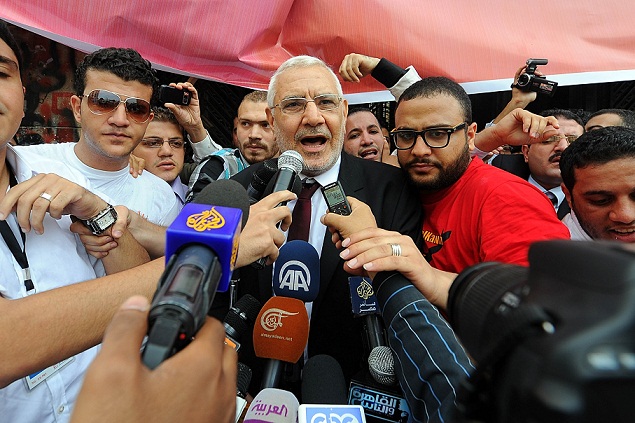
By Mohammed Nosseir
The term ‘majority’ could be a very pleasant one, used to refer to a segment of any given society. In reality, rulers and citizens tend to commit a number of mistakes based on a false assumption known as ‘majority rule’. This is what has been happening in our attempt to develop a democratic state in Egypt over the past few years; instead of working to establish solid and sustainable democratic pillars, the majority – regardless of its ideological beliefs – is undermining the process by manipulating the rule of law to serve its interests.
Politicians do their utmost to obtain a majority and come into power. In the end, however, they misunderstand the purpose of governing. Being a political majority should not be a means for politicians to issue laws that serve to design and build a state that fulfils their particular mission. Some consider majority support as their turn to exercise, and in many cases abuse, power.
Because its voice is so loud, the majority tends to overreact; its members hear themselves more than they hear their opponents. In a semi-autocratic country such as Egypt, a country that leans more towards autocratic rule, you can hardly hear the voice of the opposition; instead, you repeatedly hear the voice of the majority – and its echo.
Over the past few months, Egyptian television (both national and private channels) has been playing an essential role in mobilising citizens by only hosting guests who support and justify the president’s policies, ignoring the indisputable fact that a good portion of Egyptian society simply disagrees with these policies. Representatives of this opposition are never invited to present their arguments.
A large portion of society tends to be biased towards the ruler, not on account of his ideas or policies, but for the sake of becoming affiliated with him and thereby acquiring access to illegal benefits and / or certain business opportunities that they would not otherwise obtain. Five different rulers have ruled Egypt over the past few decades – yet certain politicians and journalists have steadfastly continued to advocate and support whoever happens to be in power. These people, whose power to influence is often considerable, inflate the size of the majority – but it is only a bubble inflation that rapidly disappears, like the foam that makes coffee look so good but provides little fullness.
President Al-Sisi, supported by his majority, is trying to advocate the concept that we (Egyptians) should form a united front in support of his policies. In essence, this concept is invalid. In any given nation, there are always citizens who are for, and others who are against, the leader’s policies and actions. The president must accept the fact that a large portion of society exists that, while it certainly loves its country, is nevertheless averse to his policies.
Former president Mohamed Morsi was a legitimate president ruling with a very tiny majority margin. He did not realise that both aspects (his legitimacy and his tiny majority backing) were not sufficient to keep him in power. The Egyptian people thus managed to get rid of him.
Al-Sisi is currently facing a different challenge. He is a legitimate president supported by a vast majority (while the 97% vote is a totally a misleading number, the president is certainly backed by a comfortable majority). Nevertheless, Al-Sisi faces challenges from both his opponents and his supporters. His government is working on marginalising opponents and, rather than promoting the country’s needs, his supporters (who attempt to criminalise anyone who disagrees with the president) are looking to be rewarded by realising their personal aspirations.
In a well-established democratic nation, the majority, once it has obtained a single extra vote above 50%, is entitled to function at full capacity. Some may therefore argue that Egypt is in perfect shape; it is governed by a constitution that was approved by 98% of the electorate, and its president was elected with 97% of the votes. Nonetheless, because Egypt is going through a difficult transitional period, we need to be more sensible. Given that Egyptian society is split into two segments – regardless of the relative weight and power of each group – the majority must proceed cautiously. Attempting to build the state based on the majority factor alone while assuming that the current regime will last forever is a misguided approach.
Rather than have the president completely take over political and economic policies, it would be far better to ensure that these policies have some degree of consensus. Furthermore, since the president, in the absence of parliament, has the authority to issue laws, he would be well advised to limit these to laws that are genuinely and urgently needed. Moreover, the president should only issue laws on which there is a consensus, to ensure that they do not favour or strengthen his political position. The recent parliamentary election law that was condemned by the president’s political supporters is a clear example of the unwise abuse of power. Please note that I am not addressing the issue of the legitimacy of the president’s authority to issue laws in the first place.
I have been part of the political opposition in Egypt since Mubarak’s era, principally because I find myself differing with the policies of the successive governments in power. This position has helped me to disaffiliate myself from any emotional attachment to any ruler, thus allowing me to claim an ability to perceive the policies of rulers more clearly than their blind supporters. Egyptian rulers will be more empowered if, rather than repeatedly reasserting their legitimacy and majority backing, they would also listen to citizens who differ with them.
During president Morsi’s era, I often advocated that he should double or triple the oppositions’ demands. I had not thought, at the time, that Morsi would be ousted eventually – still, there is no doubt that he would have been empowered had he chosen to rule Egypt inclusively. However, Morsi mistakenly believed that responding positively to the oppositions’ demands would only trigger more demands, and eventually undermine the president’s power. I will offer the same advice to Al-Sisi who, I am afraid, may not be aware that he faces any opposition apart from that of the Muslim Brotherhood.
The concept of political majority in Egypt is understood as a ‘winner’s concept’ where the ruler is allowed to extend his authority at the expense of citizens at large and of his opponents specifically (the losers’ side). In my opinion, Egypt does not need winners and losers among its citizens. We need to build a successful state wherein every citizen feels and believes that he/she has a role in the state-building process. The leader should believe in this concept and back it up by the rule of law.
If the president wants to make sound, solid and balanced decisions, he needs to heed those who differ with him more. Listening to opponents with an open mind and spirit will allow him to see things from a different perspective. He should try to disaffiliate himself from his supporters and to pay more attention to people who have ideas and values that support their country, regardless of their political affiliations. Persuasion and abiding by the rule of law are far better tools than the phenomenon of majority rule.
Mohammed Nosseir is an Egyptian liberal politician working on reforming Egypt on liberal values, proper application of democracy, and free market economy. Mohammed was member of the Higher Committee and headed the international relations of the Democratic Front Party from 2008 to 2012.


